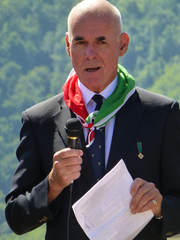Brian Lett is an author of World War Two history, and a Commendatore of the Order of Merit of the Italian Republic. He has lectured extensively upon irregular warfare in World War Two, including to the British Army.
He has homes in Gloucestershire and Tuscany. He is a recently retired Queen's Counsel who practised at the Bar of England and Wales for forty-seven years.
He has homes in Gloucestershire and Tuscany. He is a recently retired Queen's Counsel who practised at the Bar of England and Wales for forty-seven years.
childhood
I was born in 1949 to parents who had both experienced the full rigours of World War Two. My father, Gordon Lett, had been a regular soldier before that war, and served in North Africa before being captured at Tobruk. He escaped from a prisoner of war camp in Italy in September 1943, and remained behind the lines fighting with the Italian partisans for eighteen months, based in the high valley of Rossano in Northern Tuscany. He was recruited in 1944, whilst still behind enemy lines, by the Special Operations Executive, Major General Colin Gubbins’ Secret Service. He remained in the Intelligence Community for many years after the war, and was a founder member of Gubbins’ Special Forces Club.
About my mother’s war work, I was never allowed to know very much. She spent the war in heavily blitzed central London, driving secret despatches and secret people from place to place.
About my mother’s war work, I was never allowed to know very much. She spent the war in heavily blitzed central London, driving secret despatches and secret people from place to place.
A career in law
My father discouraged me from any thought of a military career (very wisely I think, since I wouldn’t have been much good), and guided me into the law, where I fought my battles in the criminal courtroom for over forty years, eventually reaching the rank of Queen’s Counsel. Over 47 years I prosecuted and defended every type of serious crime, and sat as a part time judge for over twenty-five years. One advantage that I gained from those experiences is an ability to examine evidence objectively when pursuing my love of history, and to ensure that I never arrive at any conclusion that is not fully justified by the facts.
an italian inheritance
|
When my father died in 1989, he left me an extraordinary inheritance amongst the people with whom he lived and fought in Italy. In the eyes of many of the older inhabitants of the Rossano valley and its surrounding villages, my father was a great hero, and many historical doors are open to me as a result that are closed to others. My father’s other gift to me was his personal archive of World War Two documents and photographs. However, my historical researches have led me far and wide since my first book "SAS in Tuscany" was published.
|
family life
I have four children and five grandchildren. I have a home in Rossano, where my family has inherited many of my father’s friends, and in the medieval city of Pontremoli at the foot of the mountains, which my father, together with Bishop Sismondo, saved from total destruction during World War Two.
It was because of the family ties with the area, and my love of history, that I began a number of years ago to research more deeply into the history of what had gone on there between 1943 and 1945. Since I speak passable Italian, I was able interview many of the “originals” of the partisan war.
It was because of the family ties with the area, and my love of history, that I began a number of years ago to research more deeply into the history of what had gone on there between 1943 and 1945. Since I speak passable Italian, I was able interview many of the “originals” of the partisan war.
freedom trails
In 1997, I became the Chairman of the Monte San Martino Trust, a charity set up by Allied ex-prisoners of war who had been on the run in Italy to thank those who had helped them. I was very honoured to be appointed a Commendatore of the Order of Merit of the Italian Republic in 2007 as a result, amongst other things, of my work with the Trust. As a part of my job as Chairman, I became involved in the organisation of “Freedom Trails”, re-tracing the steps of the escapers along their routes to freedom. In 2003, I began to organise Freedom Trails from Rossano, since my father had masterminded a very successful escape route through the “Gothic” front line, which held up the Allied advance from the summer of 1944 until April 1945. Although I retired as the Trust’s Chairman in 2005, I continued to re-create escape trails from Rossano virtually every year until 2014, when my legs became a little weary.
